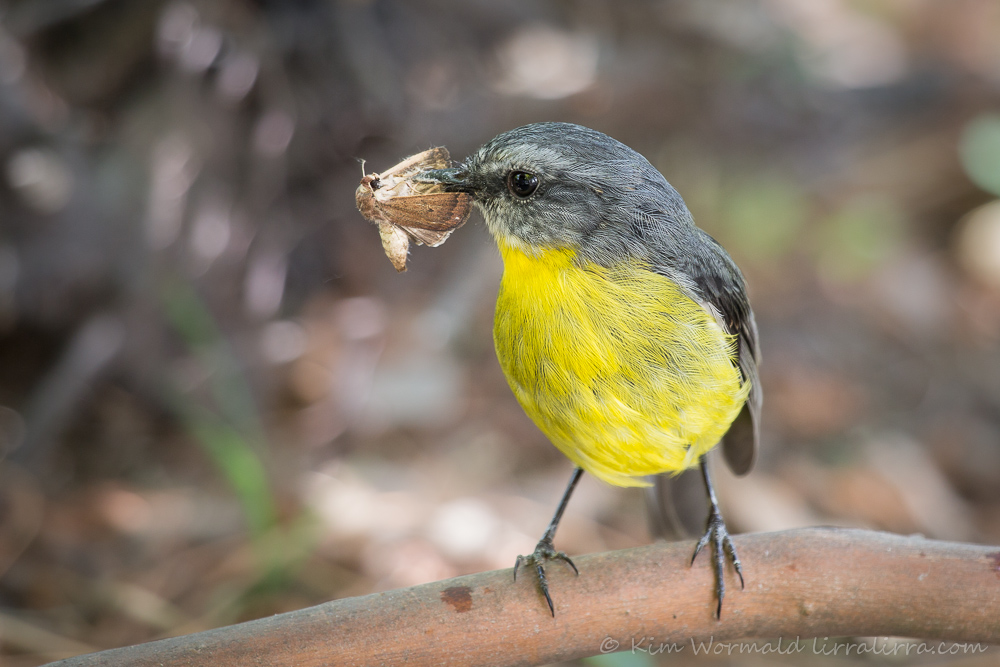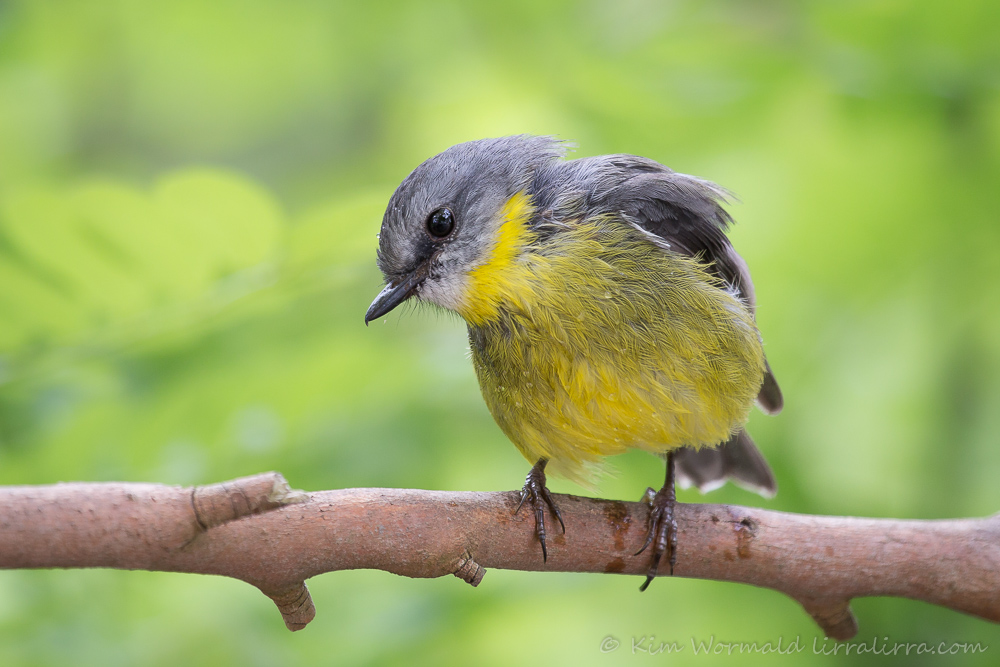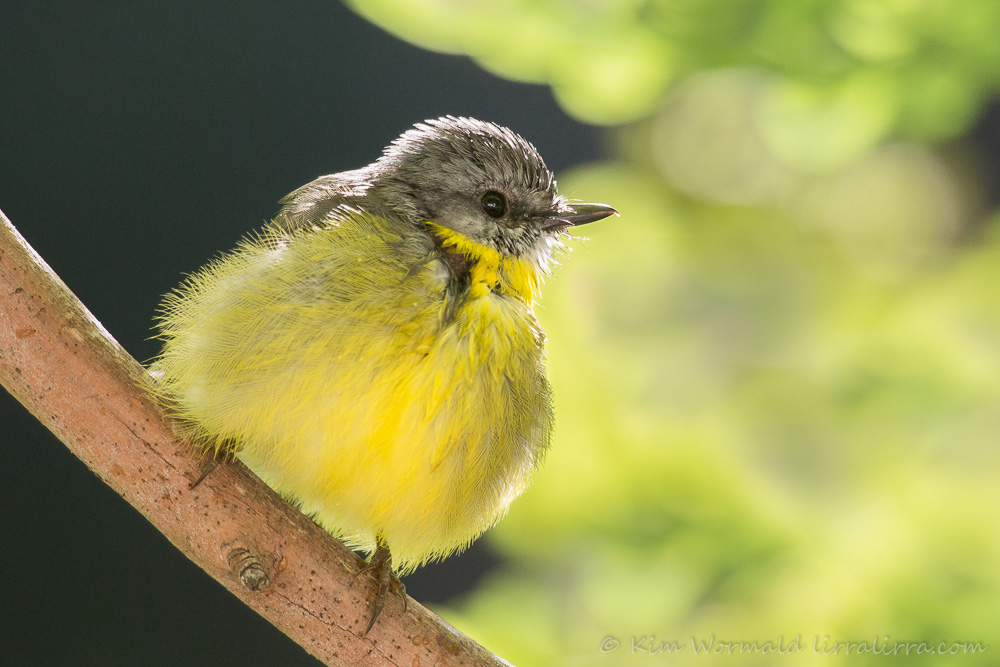I saw an Eastern Yellow Robin catch a moth. I watched through the long lens, I saw the moth trapped in the robin’s bill, I saw it waving its legs and antennae, I saw the fairy dust flying. It wasn’t a fair fight.
 Eastern Yellow Robin (Eopsaltria australis)
Eastern Yellow Robin (Eopsaltria australis)
I’m captivated by the way predator and prey are looking into each other’s eyes. The moth raised itself up to face the robin in a valiant final bid for survival. Some fairy dust can be seen tufting up from the moth’s left antenna as other tiny patches of dust float away on the breeze. The scene made me think about the Eastern Yellow Robin I saw being eaten by a Collared Sparrowhawk; that wasn’t a fair fight either. Small birds have to be super alert, they have to forage busily throughout the day while maintaining a constant vigilance to avoid becoming prey themselves. This is especially true for Eastern Yellow Robins that often forage alone. More social birds, like last week’s Red-browed Finches, share the load by looking out for each other.

Eastern Yellow Robin
Various species of robin have the same approach to foraging, they ‘perch and pounce’. They stare intently at the ground, as the robin is in the image above, before diving to capture insects, spiders and other bugs. They must have remarkable eyesight as they often fly several metres from their perch to capture their prey.

Eastern Yellow Robin
I think the robin above looks like a fluffy pompom, quite a different look from the intent stare of the other images.
My internet connection has been extraordinarily intermittent today and I’m going to sign off before the post is lost completely.
Happy birding, Kim
PS The Equipment page has been updated to include the 5D Mark III and various other items.
It is possible to receive a weekly email informing you that lirralirra has been updated – just add your address to the ‘Subscribe to email’ box above right.
Thank you Facebook ‘likers’, button above right – much appreciated.

hi kim
he is cute and very nice
you ve got it close enougth to get wonderfull shots =))
have a nice sunday, and happy birding of course ^^
It is a cute little bird Eric, I’m glad you think so too. Have a lovely week
awesome shots, sweet looking little birds
Thank you Julie.
Your Yellow breasted robin is quite different to our Red Breasted Robin Kim, not sure what direction they call our fellow but do know that they run around on the ground with their head bent to one side to listen for worms, I love watching this, always seems to amaze me that they eventually come up with a squiggly worm in their beak, have never seen them dive for their pry. Great photo of that little fluff ball. Our pretty little Woodpecker has returned to finish his job on our house, use to think this process off pecking a hole in our siding was for insects but have since learned this is their matting.
Last week I was watching Common Blackbirds foraging in the way you describe, imagine if our hearing was so good that we could hear a worm in the ground and if our eyesight was so good we could spot an insect at several metres – it could cause sensory overload! I am very fond of Woodpeckers, you’re lucky to have them at your place.
I especially like the third photo and the way each individual yellow feather sticks out from the body. Great image quality in all photos.
Thank you Rick, I like seeing those tiny feathers too.
Unfair fight – absolutely. Coincidentally, when out gardening this week I had the company of a kookaburra just a metre from where I was working. it stayed watching and listening to my chatter for 20 minutes. Then it glided to the base of a tree about 5 metres away and picked up a “stick” so I thought. Then the little twigs on the stick moved and I realized it was a stick insect which the kookaburra proceeded to devour. Unfair fight – but an amazing sight since I was so close.
A truly amazing sight, Margot! Stick insects are so well camouflaged and move so slowly that it’s amazing the kookaburra could see it at five metres. How lovely that the kookaburra stayed so close while you were gardening, clever little thing to know you were likely to turn up something for lunch.
Ooh. And aah. And how right you are about the yellow puff ball. So many birds lead such difficult lives, needing constant vigilance – and sheer effort to get the sustenance they need.
Beautiful bird – and post. Thanks.
I wonder if they get indigestion, all this looking over their shoulders while they eat? I’m glad you enjoyed the post.
Hello Kim
This bird is very very beautiful and yours pictures more !
Aw thank you Nathalie!
I like seeing the various poses and behaviors. This is a beautiful bird, and you have captured wonderful detail and color here.
I think the Eastern Yellow Robin looks amazingly different in its various pose, one day I’ll do a post that looks at that in more detail. Thanks for your comment Julie.
It is the cycle of life, this cute little Robin has to eat to survive. Beautiful bird and awesome shots. Well done. Enjoy your weekend!
Very true Eileen. I can’t begin to imagine the vigilance required to exist in the middle of the food chain. A lovely weekend to you too
Hi Kim
The third pic shows the Robin looking quite vulnerable as opposed to its predator image – good contrast and as you point out becomes the hunted rather than the hunter.
Thanks again for wonderful photos and interesting, thought provoking comments.
Alison
I wish I’d thought to say vulnerable vs predator – you make it so clear. I’m pleased you enjoyed the post Alison, thanks for letting me know.